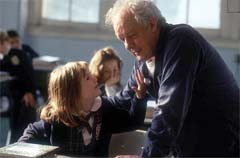
(Warning: Much gushing to ensue.)
Although I got this DVD as soon as it came out (after seeing it in theatres a couple times), I didn't actually watch it with Jim Sheridan's commentary until this weekend. It is absolutely wonderful. (This interview touches on some of it.)
Aside from describing the conflation of both himself and his father in the character of Johnny (and many other autobiographical scenes and elements), he talks about the issues of grief and death in Irish culture. The immigrants and their relation to the land. How the living enter the realm of the dead in daily life (referencing Gretta Conroy and Molly Bloom when speaking of Johnny and Sarah). How Yeats, Joyce, and Wilde each had brothers who died...as well as Van Gogh. He then discusses Van Gogh's art in relation to loss and being named after (and having to take the place of) his dead brother. How he painted absence.
This ties into Sheridan's fascination with filming the invisible, internal struggle...and the importance of a lack of information in a shot and what that does to the viewer's response. (He also mentions a certain scene in Capturing the Friedmans, which he describes as the most terrifying in cinema.)
He also comments on the idea of Shakespeare putting himself in Hamlet as the ghost of the king, the father...since he was a father whose son Hamlet had died. (And how In the Name of the Father revolves around the story of a good father.)
Then there are the Bolger sisters. The story of how Emma was cast ("You're not going to have her read my part, are you?"), and how she got Sarah cast... How every "Action!" and "Cut!" was left to Sarah and Emma, respectively. His attempt at explaining the concept of "boyfriend" to Emma. How their self-confidence lent strength to their performances.
His admiration for "Sam" Morton, Djimon Hounsou, and Paddy Considine. How he loved the idea of a man from Africa being the one to restore the father's sense of himself. The function of blood...oneness...transubstantiation...and "necessary lies."
Honestly, I could listen to him talk for hours. The combination of the deeply personal nature of this film, the contributions of his daughters, his droll self-effacing stories, and his musings on art and literature made this an enriching experience.


2 comments:
amc, great post on this! I also really liked "In America" and especially Djimon Hounsou, who's fascinated me since "Amistad." I have a script idea rattling around in my brain, with a character that could be written just for him.
Also, what scene does he refer to in "Capturing the Friedmans"? That is one of the most interesting (and, yes, disturbing) documentaries I've ever seen.
When the camera falls to the ground and the audience can hear the voices and chaos, but can't see anything.
Post a Comment